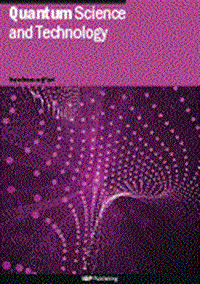论带宽调谐量子核与经典核的相似性
IF 5
2区 物理与天体物理
Q1 PHYSICS, MULTIDISCIPLINARY
引用次数: 0
摘要
量子核(QKs)广泛应用于量子机器学习应用;然而,它们在经典数据集上超越经典机器学习方法的潜力仍然不确定。这种限制可以归因于指数浓度现象,它会损害泛化。缓解这种情况的一个常用策略是带宽调优,这涉及到重新缩放量子模型中的数据点以提高泛化。在这项工作中,我们在数值上证明了qk的最优带宽调谐结果与径向基函数(RBF)核非常相似,导致与经典方法相比缺乏量子优势。此外,我们发现最优带宽调优参数的大小进一步简化了qk,使它们表现得像多项式核,对应于RBF核的低阶泰勒近似。我们对保真度量子核和投影量子核使用不同的数据编码电路进行了深入的研究。我们提供了数值证据,并推导了一个简单的分析模型,阐明了带宽调整如何影响分类任务中的关键数量。总的来说,我们的发现揭示了使QK方法经典易于处理的机制。本文章由计算机程序翻译,如有差异,请以英文原文为准。
On the similarity of bandwidth-tuned quantum kernels and classical kernels
Quantum kernels (QKs) are widely used in quantum machine learning applications; yet, their potential to surpass classical machine learning methods on classical datasets remains uncertain. This limitation can be attributed to the exponential concentration phenomenon, which can impair generalization. A common strategy to alleviate this is bandwidth tuning, which involves rescaling data points in the quantum model to improve generalization. In this work, we numerically demonstrate that optimal bandwidth tuning results in QKs that closely resemble radial basis function (RBF) kernels, leading to a lack of quantum advantage over classical methods. Moreover, we reveal that the size of optimal bandwidth tuning parameters further simplifies QKs, causing them to behave like polynomial kernels, corresponding to a low-order Taylor approximation of a RBF kernel. We thoroughly investigate this for fidelity quantum kernels and projected quantum kernels using various data encoding circuits across several classification datasets. We provide numerical evidence and derive a simple analytical model that elucidates how bandwidth tuning influences key quantities in classification tasks. Overall, our findings shed light on the mechanisms that render QK methods classically tractable.
求助全文
通过发布文献求助,成功后即可免费获取论文全文。
去求助
来源期刊

Quantum Science and Technology
Materials Science-Materials Science (miscellaneous)
CiteScore
11.20
自引率
3.00%
发文量
133
期刊介绍:
Driven by advances in technology and experimental capability, the last decade has seen the emergence of quantum technology: a new praxis for controlling the quantum world. It is now possible to engineer complex, multi-component systems that merge the once distinct fields of quantum optics and condensed matter physics.
Quantum Science and Technology is a new multidisciplinary, electronic-only journal, devoted to publishing research of the highest quality and impact covering theoretical and experimental advances in the fundamental science and application of all quantum-enabled technologies.
 求助内容:
求助内容: 应助结果提醒方式:
应助结果提醒方式:


